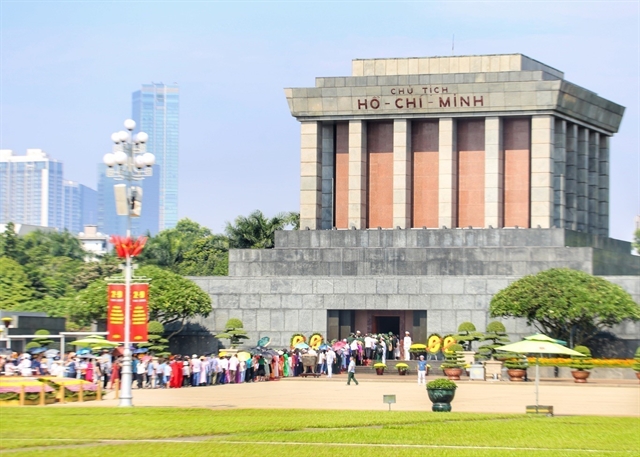 Society
Society

 |
| Hồ Chí Minh Mausoleum in Hà Nội. — VNA/VNS Photo |
HÀ NỘI — A draft ordinance on the management and preservation of Hồ Chí Minh Mausoleum is underway, aiming for self-reliance in human resources training and equipment supply especially against outside disruptions.
According to the Ministry of National Defence (MOD), investment policies for scientific research are necessary for the mission of preserving late President Hồ Chí Minh’s body and ensuring the technical requirements of the mausoleum, especially as the complicated global developments caused multiple challenges to the technical supply and resources from abroad.
Throughout 55 years of preservation and protection of the late president’s body (since 1969) and 49 years of the historical mausoleum, the President Hồ Chí Minh Mausoleum High Command and the establishment’s management board have upheld compliance with the direction and leadership of the Party and the State, particularly the Government, Prime Minister, the Central Military Commission and the MOD to accomplish the special political mission assigned.
The condition of the body remains unchanged between different inspections (from 1970 to 2009).
Inaugurated on August 29, 1975, the Hồ Chí Minh Mausoleum has welcomed nearly 70 million visitors, of which more than 10 million are international.
On average, the establishment receives approximately 10,000 visitors per day. This figure goes up to around 32,000 on national holidays such as the Lunar New Year, Independence Day (September 2) and the late president’s birthday (May 19).
The preservation of late President Hồ Chí Minh’s body was carried out with the complete assistance of the Soviet Union from 1969 to 1991, therefore Việt Nam has not issued any regulation, or adopted a comprehensive legal basis for the State-level scientific council and the medical scientific council working on this mission.
Following the dissolution of the Soviet Union in 1991, the mausoleum’s management board has stepped up to take charge of the technical procedures and requirements to preserve the late president's body, which calls for the issuance of laws and ordinances to regulate this mission.
A number of shortcomings and issues have been pointed out, including the risk of shortage or hindered import of single-purpose equipment manufactured abroad in the event of global disruptions (such as COVID-19 pandemic or Russia-Ukraine conflict) which necessitates investment in research and human resources development to ensure self-sufficiency in the long-term preservation.
Another issue was the need for special allowance regimes for officials, public employees and workers of the mausoleum's management board given that they are trained in highly specialised and narrow fields that are applicable only in the work of preservation of President Hồ Chí Minh's body, in order to retain and attract talents in this important task.
The management board also wanted clearer, more uniform policies on the authorisation of important political and diplomatic ceremonies and events that are conducted at the mausoleum and Ba Đình Square, as well as policies on the dual functions of the mausoleum (preservation of Hồ Chí Minh's remains and maintenance of safety and security in the complex, while enhancing the serving of domestic and international visitors who wish to pay respect to the late President).
This draft ordinance is developed with four core policies, which are improving regulations on the long-term preservation and protection of late President Hồ Chí Minh’s body; enhancing regulations on the management and protection of structures and relics within the historical site of Hồ Chí Minh Mausoleum; personnel tasked with preserving and protecting the late president’s body; and perfecting regulations on ensuring human resources as well as related policies and employment benefits for these missions. — VNS




